Constitution Hill, Smithsonian National Museum of African Art
Theme:What Comes First?
Conductor:Simon Njami
Lungile Hlatshwayo, Kwanele Godfrey Ngwenya, and Mthabisi Sithole, editorial statement from AtWork catalogue.
AtWork Johannesburg Chapter 21 has been implemented by the Moleskine Foundation in partnership with Constitution Hill and the Smithsonian National Museum of African Art. The workshop took place in the Old Fort Human Rights Conference Room at Constitution Hill, a living museum that tells the story of South Africa’s journey to democracy. It was the third leg of “What comes first?” 2022 Tour and the first ever AtWork event in Johannesburg.
Simon Njami comments on the topic:
There has been an ongoing debate between Jean-Paul Sartre and Albert Camus on choices and responsibility. When asked what his choice between his mother and his country would be, Camus replied without any hesitation, my mother.
Of course, Sartre, who placed the idea and the cause above everything, disagreed. We are faced on a daily basis, with critical choices that force us to take a stand or an action. The way we decide what comes first is never as fixed as for Sartre and Camus. There are times when we would make different choices and choose different priorities, depending on the situation. But the reality is that it is a question we shall never be able to answer to our full satisfaction. It is like trying to answer the impossible question: what came first, between the egg and the hen? Aristotle tried to venture a solution: “the domain of becoming is opposed to that of the essence because what is posterior in the generational order is, by nature, anterior and what comes first by nature is last in the generational order.”
In the meantime, the Coronavirus has arisen and changed priorities, forcing some of us to live in an emergency that darkened our vision of the future and obscured any routine-free reflection. It is urgent for all of us to regain this ability to think outside of exceptional contingencies.
But we are all free to disagree.
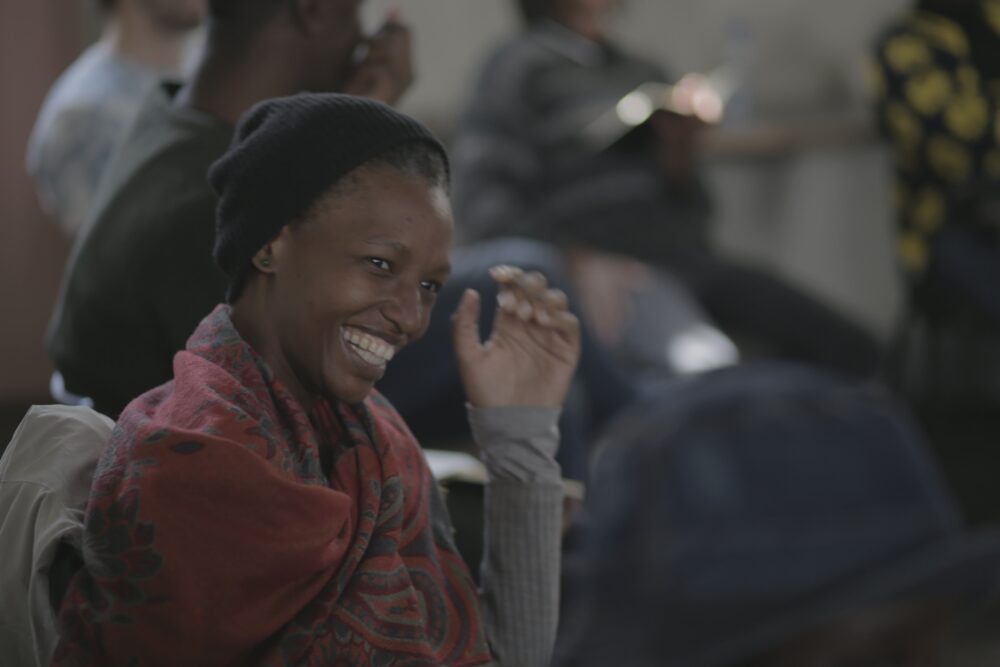
The workshop took place at Constitution Hill from August 26th to August 30th, 2022 and was conducted by AtWork advisor Simon Njami. Under his guidance, 24 young and bright South African individuals came together to figure out what comes first for them.
Over the week, these creative minds composed of filmmakers, photographers, writers, painters, dancers, and much more had the opportunity to debate, critique and exchange. The commonality of their narratives compelled them to dig deeper to identify their individuality more firmly. What started from a perspective of wider collective thinking gradually progressed into deeper individual introspection to confront the questions at hand authentically.
These reflections led to creative outcomes transferred onto a notebook given to each participant which now is a representation of ‘what comes first?’ for each of them as social animals
Lungile Hlatshwayo, Kwanele Godfrey Ngwenya, and Mthabisi Sithole, the editorial statement from AtWork catalogue.
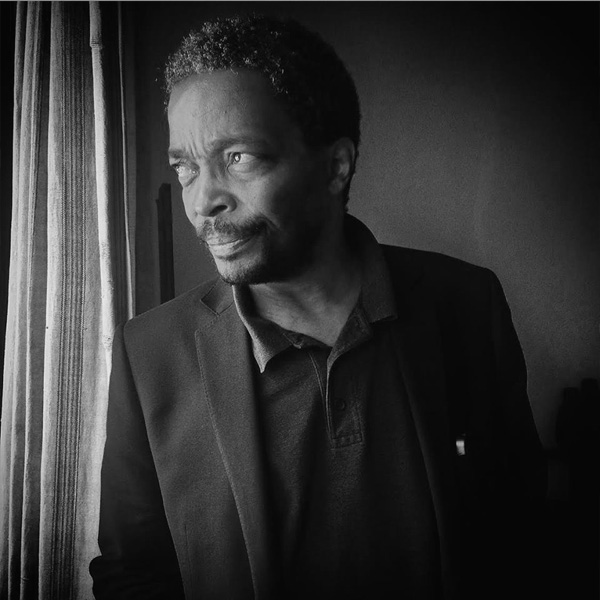 The leader
The leader
Simon Njami is an independent curator, lecturer, art critic, and writer. He is the co-founder and editor-in-chief of “Revue Noire.” Previously, Njami was the artistic director of the Bamako Photography Biennial 2000-2010 and co-curator of the first African pavilion at the 52nd Venice Biennale in 2007. He has curated a number of contemporary art and photography exhibitions, including Africa Remix (2004-2007) and the first African art fair in Johannesburg in 2008. In 2014, The Divine Comedy exhibition, created and curated by him, started a world tour at the MMK (Museum für Moderne Kunst) in Frankfurt, moving on to the SCAD Museum of Art in Savannah and the Smithsonian Museum of African Art in Washington, DC. He is the director of the Pan African Master Classes in Photography, a project created in partnership with the Goethe Institute; artistic director of the Donwahi Foundation (Abidjan, Ivory Coast); advisor to the Sindika Dokolo Collection (Luanda, Angola); secretary of the special jury of the World Press Photography Awards; artistic director of the first edition of Off Biennale (Cairo, 2015) and the 2016 and 2018 Dak’Art.
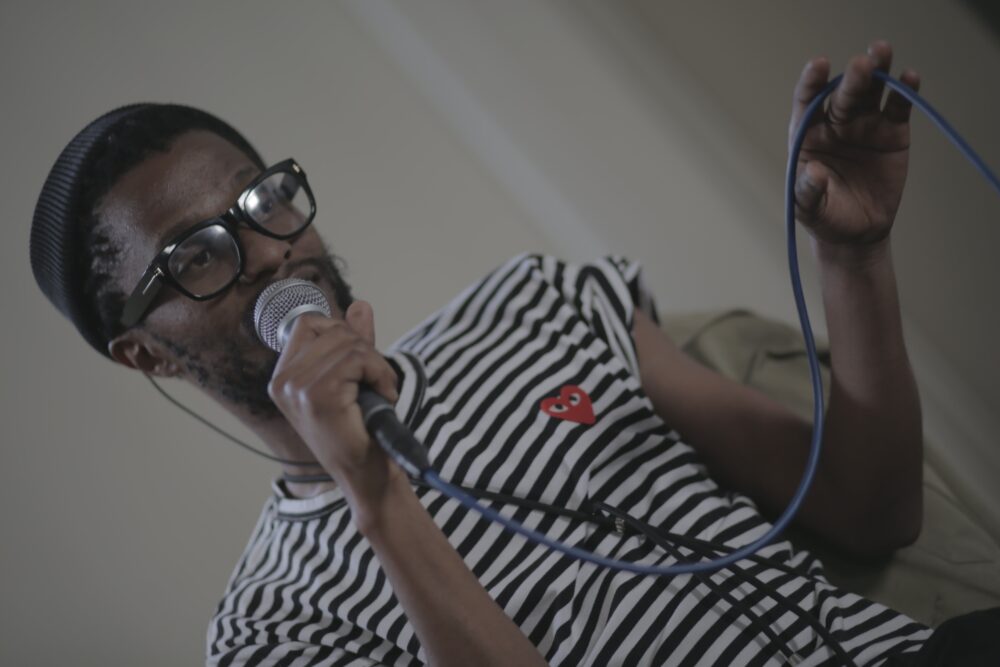
The participants started by generally introducing themselves to one another and were immediately challenged to dig deeper to communicate the aspects that define their sense of identity and did not come easy at first. As time progressed, the conversation continuously transitioned from an introspective to an outward-looking tone. Their answers to ‘What comes first?’ became more transparent and more unique daily as they discussed, exchanged, and reflected collectively and individually.
They experienced intense moments of questioning where they shared their art, traumas, and biggest aspirations. In the end, they had the opportunity to present their notebooks to their peers in an intimate setting before the broader event. Since the workshop took place during a Smithonian-led initiative, they also had the opportunity to directly exchange with members of the institution, such as Ngaire Blankenberg, the Director of the Smithsonian’s National Museum of African Art, and sharpen their understanding of the following events. Moreover, iconic South African photographer and AtWork Faculty member Andrew Tshabangu, was also present during the experience in preparation for his upcoming AtWork experience in Soweto.
To invite the general public to the discussion, we held a public talk on September 2nd at Constitution Hill. They had the opportunity to listen to an insightful conversation between Moleskine Foundation’s CEO Adama Sanneh and Simon Njami, moderated by writer and lawyer Lwando Xhaso. The talk further demonstrated how the intellectual and emotional tools that the participants received during the workshop are crucial to help them deal with their racial past and complex everyday reality. This moment was a solid representation of AtWork’s purpose: to liberate and unlock parts of our minds through debate, critique, and exchange.
Rory Tsapayi, Kutlwano Monyai, Victoria Kgongoana, Nobuhle Mavundla, Tlhalefi Maditsi, and Masindi Ikhona Nafisa Mbolekwa, the curatorial statement of AtWork Catalogue.
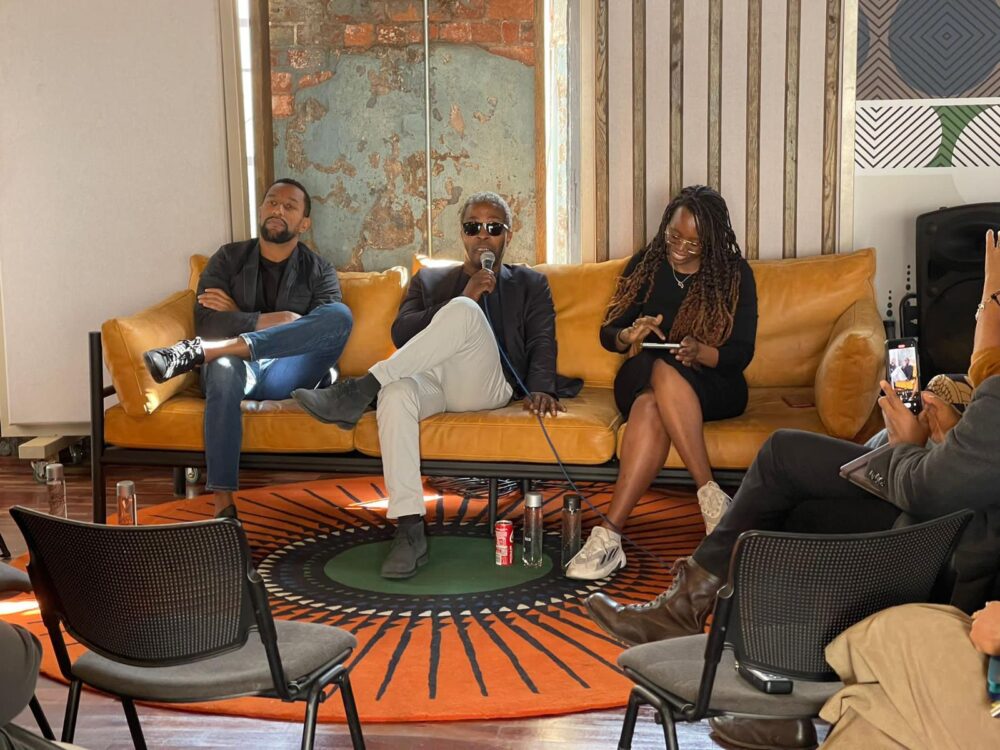
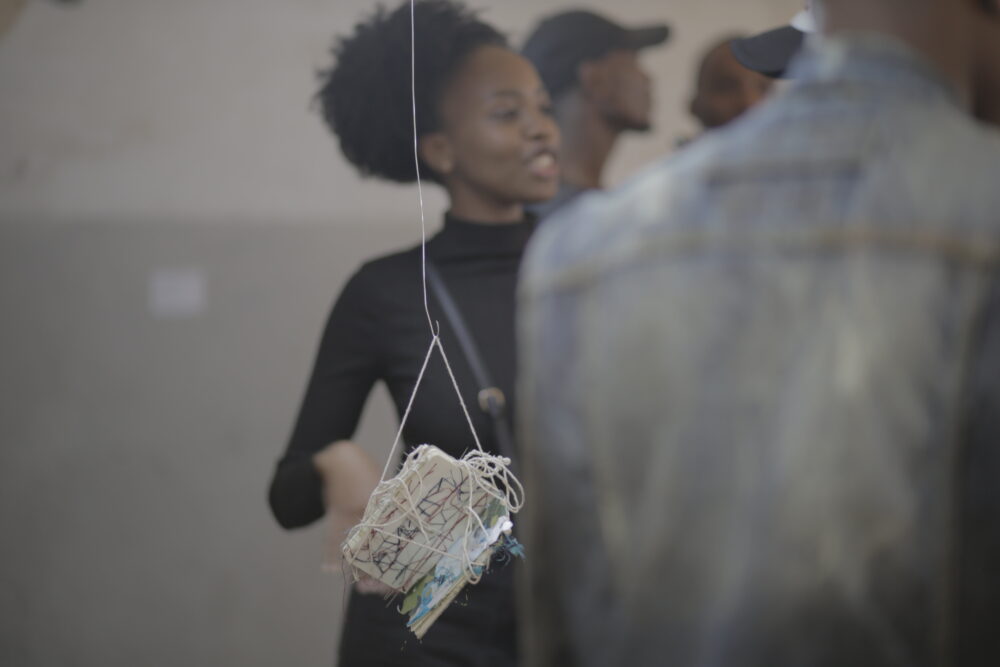
The 24 creations from AtWork Johannesburg entered a wider project entitled ‘The Demonstration’, a 10-day experience presented by the National Museum of African Art, curated by Siwa Mgoboza.
The experiences focused on the theme of ‘Our Shared Future: Reckoning with Our Racial Past’ as part of the Smithsonian’s institutional effort to explicitly address systemic racism and racial inequality through the lens of art and creativity.
It was a great opportunity for the participants to be a part of this wider initiative and to share a part of their experience with their family and close friends. The notebooks were exhibited in the Old Fort of Constitution Hill on September 2nd and will remain on display until October 30th.
The catalogue, created by the participants in 48 hours, features their works and associated descriptions.